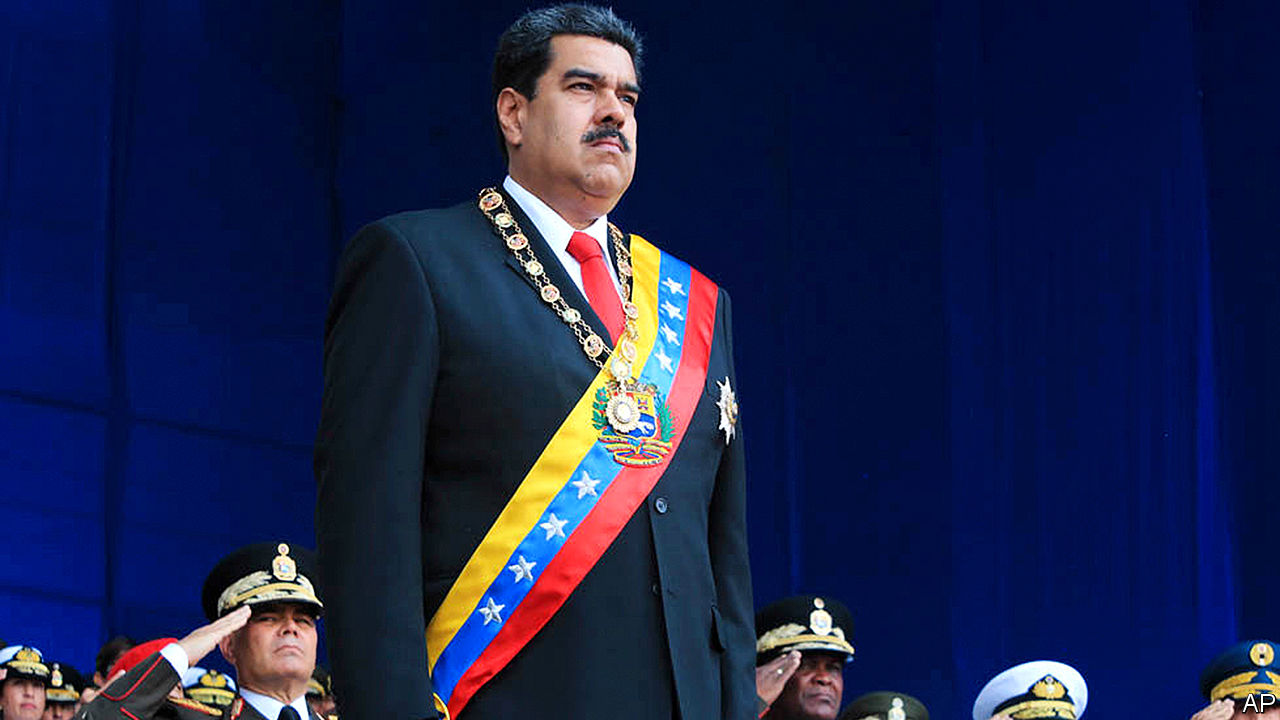 NICOLÁS MADURO calls it “a really impressive magic formula”. His paquetazo rojo (big red package) features a new currency that lops five zeroes off the nearly worthless bolívar, a sharp increase in the price of fuel and a rise in the minimum wage of more than 3,000%. Forget magic. The president’s formula, even with some welcome new bits of realism, will almost certainly fail to rescue Venezuelans from their economic agony. Venezuela has the world’s worst-performing economy among countries not at war. GDP fell by more than a third between 2013 and 2017. Inflation could pass a million per cent this year, says the IMF. The country with the world’s largest oil reserves cannot import enough food and medicine. Water shortages and blackouts plague cities. More than 2m Venezuelans have fled, unsettling neighbours (see article).
NICOLÁS MADURO calls it “a really impressive magic formula”. His paquetazo rojo (big red package) features a new currency that lops five zeroes off the nearly worthless bolívar, a sharp increase in the price of fuel and a rise in the minimum wage of more than 3,000%. Forget magic. The president’s formula, even with some welcome new bits of realism, will almost certainly fail to rescue Venezuelans from their economic agony. Venezuela has the world’s worst-performing economy among countries not at war. GDP fell by more than a third between 2013 and 2017. Inflation could pass a million per cent this year, says the IMF. The country with the world’s largest oil reserves cannot import enough food and medicine. Water shortages and blackouts plague cities. More than 2m Venezuelans have fled, unsettling neighbours (see article).
Mr Maduro says this is the fault of “imperialist” powers like America, which are waging “economic war” on Venezuela. In fact, the catastrophe is caused by the crackpot socialism introduced by Hugo Chávez and continued by Mr Maduro after Chávez’s death in 2013. Expropriations and price controls have undermined private firms, depressing production. Corruption has subverted the state. Mismanagement of PDVSA, the state-owned oil company, has caused oil output to drop by half since 2014. Just as the regime has asphyxiated democracy, by rigging elections and governing without reference to the opposition-controlled legislature, so it has strangled the economy.
Belatedly, Mr Maduro has recognised the need for change. He has admitted for the first time that hyperinflation is caused by the unbridled creation of money to finance the budget deficit, which will exceed 30% of GDP this year, according to the IMF. By reducing fuel subsidies and raising taxes, he now aims for a “zero deficit”. His paquetazo devalues the currency from the official rate of 250,000 old bolívares to the dollar—available to a favoured few—to the market rate of 6m.
But Mr Maduro has set up his plan to fail. The new “sovereign bolívar” is supposedly pegged to the petro, a new unit of account that is ostensibly backed by oil reserves. But since no one knows how the petro will work and nothing binds the new currency to it, this peg inspires little confidence. In practice, the regime can still print as many bolívares as it chooses. The pledge to eliminate the budget deficit is undermined by a recent tax break for the oil industry and the rise in the minimum wage. This will swell the public-sector wage bill, stoke even more inflation and bankrupt firms. There is talk of tougher price controls, which would further discourage production.
A hat with no rabbit
With somebody else in charge, Venezuela might still have a chance. A competent president would keep parts of Mr Maduro’s therapy, such as the devaluation, and add new remedies. Business would be freed from price controls and given legal security. The bolívar would be issued by a truly independent central bank, or perhaps replaced by the dollar. Venezuela would gain external credibility and financial support by negotiating an adjustment agreement with the IMF. It would start serious negotiations to restructure its foreign debt.
All this would need the co-operation of the opposition and of the international community. It is hard to imagine any of it happening while Mr Maduro is president. Venezuela needs real reform, not hocus-pocus.This article appeared in the Leaders section of the print edition under the headline "Maduro’s magic money tree"
You’ve seen the news, now discover the story
Get incisive analysis on the issues that matter. Whether you read each issue cover to cover, listen to the audio edition, or scan the headlines on your phone, time with The Economistis always well spent.
No comments:
Post a Comment